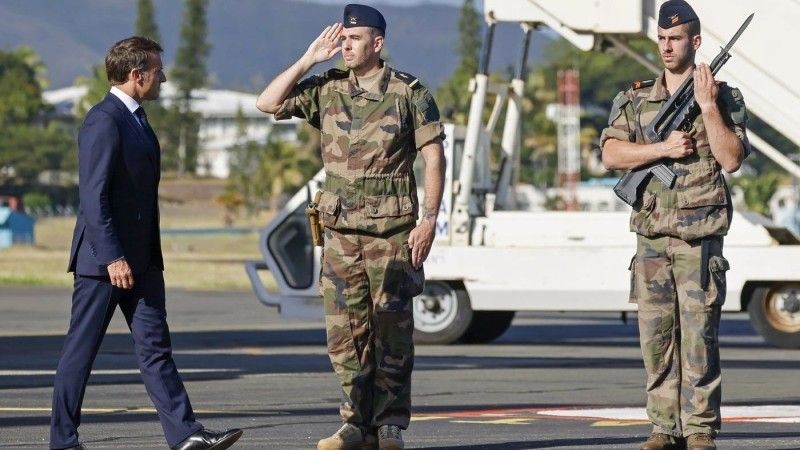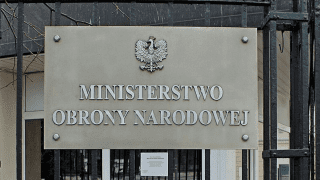- ANALIZA
- WIADOMOŚCI
The Turbulent Relationship of France with its Pacific Territories
New Caledonia has become an area of conflict in recent weeks and has emerged as one of the greatest security challenges for Paris. Although independence referendums have been held three times in recent years, each time the results have favored France. The situation in other overseas territories must also be monitored, as French Polynesia and Wallis and Futuna are significant elements in the foreign policy of the Fifth Republic. It is worth noting that France is the only European Union country that possesses its own territories in the Pacific Ocean and has the largest exclusive economic zone in the world.

Recent events in New Caledonia highlight the need for discussion about the overseas territories of the French Republic, especially in the Indo-Pacific. During Emmanuel Macron’s presidency, there has been a marked increase in interest in the region due to Paris« strategic interests there. First, in 2018, France published its security strategy for the Indo-Pacific region, signaling its plans for the area. Four years later, it emphasized its growing engagement, naturally assuming the role of the main EU representative and a key partner in Asia and the Pacific.
France’s presence in the Indo-Pacific is primarily due to its overseas territories. Notably, 93% of its exclusive economic zone is located in the Indian and Pacific Oceans.Over 1.6 million French citizens live in this region, and there are also a total of 8,000 troops stationed there. This territory, where the interests of Australia, China, India, Indonesia, Japan, South Korea, and the USA converge, has become extremely important for Paris. This is mainly due to the maritime trade routes linking Europe and the Persian Gulf with the Pacific Ocean, via the Indian Ocean and Southeast Asia. Properly utilized, these routes enable active participation in global trade and investments (trade with the Indo-Pacific region accounts for over one-third of France’s trade outside the EU and has increased by 49% over the past 10 years).
Among all European Union countries, France has the greatest capabilities and interests in the Indo-Pacific region due to the numerous territories it controls. These include islands like Mayotte and Réunion in the Indian Ocean, and New Caledonia, French Polynesia, and Wallis and Futuna in the Pacific Ocean. Historical aspects also play a significant role. Countries like Vietnam, Laos, and Cambodia were under Paris« control for a long time, which also led to French involvement in the Indochina War from 1946 to 1954. To this day, France maintains important political, linguistic, and cultural ties with these nations.
(De)Colonial State of Suspension
Two of the three French overseas territories in Oceania—New Caledonia and French Polynesia—are designated as non-self-governing territories by the UN. Chapter XI of the UN Charter includes provisions for the decolonization of such areas, a point eagerly emphasized by New Caledonian pro-independence politicians. The issue of breaking away from the Metropolis first appeared on the legal agenda of the Kanak people with the Nouméa Accord of 1998, which included provisions for a series of independence referendums. The failure of the three subsequent referendums in 2018, 2020, and 2021 has led to further separation between the indigenous population of New Caledonia and the immigrant community from mainland France, who are better off both materially and politically.
The ethnic and political division in New Caledonia has echoed in the neighboring archipelago of French Polynesia, which has historically served the Fifth Republic as, among other things, a nuclear test site. Its geographical location, particularly the distance of the islands from the mainland, prompted France to conduct 193 atmospheric and underground nuclear tests in French Polynesia between 1966 and 1996. These explosions produced radioactive clouds that directly threatened the health and lives of the local population. During and after the tests, their true impact on the region remained a closely guarded state secret. As a result of the nuclear tests, the soil and rainwater are significantly contaminated. The rise in cancer rates from 1992 to 2017 led to a complaint being filed with the International Criminal Court (ICC) against France for crimes against humanity in the regionThe spokesperson for the case is former President Oscar Temaru, who has been advocating for an independence referendum in French Polynesia since the 1970s.
Tricolored Troops in New Caledonia and French Polynesia
France’s international presence dictates its military activity in Oceania and the Indo-Pacific. The Armed Forces in New Caledonia (FANC) consist of 1,650 soldiers and civilian personnel, with operations spanning the army, navy, and air force. FANC’s mission is to defend French territories, the exclusive economic zone, and maintain operational and intervention capabilities. The FANC is responsible for fleet protection, fishery control, combating water pollution, and preventing illegal trade. Additionally, FANC provides disaster and humanitarian assistance to regional states.
The Armed Forces in French Polynesia (FAPF) comprise 1,200 soldiers and civilian personnel, with their main base located in the capital, Papeete. The duties of FAPF overlap with those of
FANC, focusing on interoperability and complementarity to fulfill prevention and security tasks in the Asia-Pacific region.
The activities and presence of FANC and FAPF in the Indo-Pacific serve not only to deter threats and ensure conventional security for France’s interests. In the 21st century, the growing threats of climate change and influence competition (particularly France’s balancing act between Washington and Beijing) are significant concerns. The established missions are meant to complement France’s economic presence and enhance regional cooperation with partners such as the Melanesian Islands, Australia, and New Zealand.
Pacific Ententes Cordiales
The updated 2021 French Strategy in the Indo-Pacific and the 2022 French Defence Strategy in the Indo-Pacific enumerate a range of threats to Paris« interests and emphasize the importance of Forward Defence Forces (including FANC and FAPF). French policymakers also stress international cooperation with countries such as Japan, India, Australia, and New Zealand.
Strategic differences between Washington and Paris in the Indo-Pacific do not signify a freeze in military cooperation, evidenced by exercises like La Pérouse and the Jeanne d’Arc 2023 mission. The shift in the contractor for nuclear-powered submarines by Australia and the formation of the AUKUS alliance prompted Paris to seek alternative avenues for enhanced collaboration. Since then, France has intensified its military alliance and defence diplomacy with India. Examples of fruitful military cooperation include the FRINJEX-23 and Shakti 2024 exercises.
Presidential Delegation in Nouméa
On May 22, 2024, Emmanuel Macron, along with Interior Minister Gérald Darmanin, Defence Minister Sébastien Lecornu, and Minister for Overseas Territories Marie Guévenoux, arrived in the capital of New Caledonia. The French President held discussions with the High Commissioner of France, Louis Le Franc, New Caledonian politicians, and representatives of economic entities on the island. Prime Minister Gabriel Attal emphasized that a special mission would be established, consisting of three high-ranking officials who would remain on-site „as long as necessary” and „strive to establish local political dialogue to achieve a comprehensive political agreement.”
The announcement of the presidential visit was met with an unprecedented DDoS cyberattack on the island, targeting the internet service provider. The attack was reportedly thwarted before causing damage to the cyber infrastructure, with the source identified as the Russian Federation.
During his meeting with the High Commissioner, President Macron confirmed that 3,000 security personnel would remain in New Caledonia „as long as necessary, even during the Olympic Games.” The head of state expressed a desire not to extend the 12-day state of emergency, contingent on a return to pre-riot conditions. He also met with representatives of the independence movement, the Caledonian Union, the President of the Caledonian Congress, Roch Wamytan, and the leadership of the socialist Palika party.
Macron announced that security forces would reclaim „every neighborhood, every roundabout, every barrier”, and that „the goal is to restore peace and order as quickly as possible”. He confirmed the mobilization of counter-terrorism units GIGN and RAID, as well as the deployment of additional helicopters and armored vehicles.
The President’s declarations took on an apologetic tone due to the mishandling of the referendums. Emmanuel Macron pledged not to introduce constitutional reform. In his address to the press, the President stated that he wants the agreement reached with political forces to be „put to a vote by the Caledonians.” Financial issues were also addressed, with plans to establish a zero-interest loan program and a solidarity fund for salaried workers and entrepreneurs.
A Bad Example for Others
The presidential palace and the French government decided to approach the events in New Caledonia based on the principle of „en même temps” (at the same time), a hallmark of Macron’s policy, where often two conflicting elements or situations are pursued simultaneously. The President made it clear that security issues are indivisible, and the priority is to restore the pre-riot status. Concurrently, he emphasized the need for responsible dialogue that would involve the Kanak people in political responsibility for Nouméa. Combining these two issues could achieve an ideal state, but the current chances of achieving such a result are close to zero.
The effectiveness of Paris« actions can only be assessed after some time. An open question remains regarding the willingness of the Kanaks to reconcile and the credibility of the
presidential declarations. Similarly, in terms of security in French Polynesia, which is struggling under the pressure of migrants and a surge in crime. Meanwhile, Wallis and Futuna have caught the particular interest of China, which is already conducting its own (dis)information policy towards this overseas territory.
The events in New Caledonia add another precedent to the internal politics of the Fifth Republic. Representatives of other overseas territories and departments of France will likely refer to this incident. Separatist activists from French Polynesia and Wallis and Futuna are in a position to „play the decolonization and independence card” to extract concessions from Paris and President Macron. The Pacific archipelagos are indeed France’s crown jewels, especially since a significant part of Paris« future foreign policy will be played out in the Indo-Pacific.















